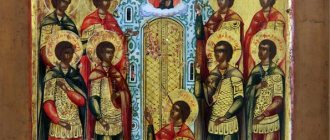Where is the Kingdom of God
“For behold, the kingdom of God is within you.” Jesus is saying that our heart is the battleground between God and Satan. And each of them lays claim to our heart and wants to establish their kingdom within us. If God wins, it means that the Holy Spirit—the Kingdom of God—settles in our hearts.
Jesus and the Pharisees
This question was asked by the Pharisees and here the following misunderstanding arises: did Jesus really mean that the Kingdom of God is within the Pharisees?
Where does the Kingdom begin?
The Kingdom of God - the Kingdom of Heaven - begins when a person finds his King and Lord: and for Christians, this entry into the Kingdom is directly related to the birth of water and the Spirit in the sacrament of Baptism.
When the priest asks the person being baptized: “Do you believe Him?” - the one preparing to be born into the New Kingdom answers: “I believe as the King and God!”
Therefore, Baptism is not just some kind of “cleansing” ritual, but a highly responsible moment: accepting Christ as his Lord and Savior, plunging into His death and rising with His Resurrection from the waters of the font, he takes an oath of allegiance to his King and God. From now on, man is no longer alone: he is in service, he is “at work,” he does not belong to his desires and lusts, but works for his King and God, thereby manifesting His Kingdom in this world. But this is not only what a Christian prays for every day when he asks in the Lord’s Prayer “Thy kingdom come”: his prayer is not only that there will be more and more of these points of God’s living and active presence in the world through His faithful subjects.
Our hope and expectation is to see that moment when the firmament will curl up, the stars will disappear, the dead will rise - this long, such an endlessly long cold night of sin will end, and a new Day will open, the Bright Day of Christ's Kingdom.
However, we must prepare for this day now. “Whoever has not seen Christ here, in this life, will not see Him there either,” said St. Barsanuphius of Optina.
Photo h.koppdelaney/flickr.com
My kingdom is not of this world, says Christ. And His followers, Christians, on the one hand, have no other world to live in than this, which by default is hostile to Christ. But on the other hand, the Kingdom by which they live, the Kingdom of Christ, is not of this world. This internal tension - from the inevitability of life in this world and the impossibility of living according to its worldly laws - turns out to be very productive in real life: this is how asceticism, the science of strategy and tactics in the spiritual war against sin and passions, is born. It is in this deep inner tension that a Christian matures. Therefore, the Kingdom of Heaven is “needed”, taken with effort, it “pushes its way” only with the hands of man himself, with his personal labors it conquers more and more territories on enemy soil.
The Kingdom of Heaven Has Drawn Near
(Matthew 3:1-2) In those days John the Baptist comes and preaches in the wilderness of Judea and says, Repent, for the kingdom of heaven is at hand.
(Matthew 4:17) From that time Jesus began to preach and say: Repent, for the kingdom of heaven is at hand.
A lot of texts are devoted to this topic. The entire Sermon on the Mount is, in fact, the rules of the Heavenly Kingdom. When Jesus Christ speaks about the Kingdom of God, he uses one interesting phrase - “The Kingdom of God is at hand.” In the Greek translation it sounds like an action that has already been completed and the main emphasis is on the result of the action.
It has come closer - close, practically here, that is, the result is already visible, it can be felt.
I came to my people, and they didn’t accept my people...
If you carefully read the Gospel and think about all the words of Christ about the Kingdom of God, it becomes obvious: it was this teaching that became fatal for His earthly life. The Jews longed for the Kingdom, raved about the King - but not the kind that Christ turned out to be. And the Savior was ready for this: unlike many false prophets and false messiahs, He was not at all worried about the external effect of His preaching. He knew what he was doing. And he understood perfectly well what the price is for words and what the price is for deeds. It is enough to remember how, after words about the need to eat His Body and drink His Blood as an immutable condition of life with God, many turn away from Him and leave. And so, instead of, as they would say today, “change tactics” and “make adjustments” for greater effectiveness of preaching, Christ turns to His closest disciples: “Don’t you also want to leave?”...
Photo by Vladimir Eshtokin
The doctrine of the Kingdom of Heaven is key to the entire gospel narrative. From the point of view of the Jews, all this is nothing more than some kind of abstraction, in no way connected with the realities of life. Therefore, He Who so boldly dares to assert His Sonship of God - and thereby transform this “incomprehensible fiction” into Divine Revelation - must be killed, and killed shamefully, as an edification to all others, so that no one would be bothered to try to destroy what they believed Old Testament Jews - preserved the authenticity and integrity of the Jewish people for centuries. Who else, besides the Jews, perfectly understood and remembered what the Kingdom was? Saul, David, Solomon - all of them were inscribed in the history of the Jewish people not only as kings, saints and prophets, but also as builders of that very kingdom, through the ruins of which this newly minted Prophet now walks and tells strange things about the Heavenly or Divine Kingdom!
Christ's questioners - Jews - are very specific people in their attitude to everything that concerns areas of life that are important to them. The rich experience of survival in a hostile environment taught them exceptional pragmatism, and the complex institutions of the Mosaic Law delicately honed this ability for a quick rational response from generation to generation.
And when you read how they listen to Christ’s words about the Kingdom, you get the feeling that this incessant aggressive background of questions is literally ringing in the air: “Where is this Kingdom, show it to us! When will this Kingdom come? And what can you compare it to, how can you touch it, touch it, see it? Isn't this all a bluff?..."
And the Answer was before their eyes, walking, talking, healing the sick... Only later, after the Resurrection, the Apostle John will remember with a deep feeling of sincere amazement - how they could see Him, the Word of Life, the Son of God, with their eyes, touch with their hands, eat and drink with Him. This is difficult to fit into the consciousness of even His closest disciples - those who saw Him Risen. What then can we say about those who looked at this wandering preacher like that, out of the corner of their eye, casually - there are a lot of people walking around here...
When will the Kingdom of Heaven come
But we know that the Kingdom of God must come when Jesus Christ comes to our earth for the second time.
Thus, when Jesus Christ announced that the Kingdom of God was at hand, He announced the beginning of a new eschatological era.
Jesus tells the Pharisees that the Kingdom of God will not come in a visible or visible, noticeable way. However, in other places of scripture, He Himself speaks of signs of the coming of the Kingdom of God. And here a contradiction arises. To understand this, you need to understand what the Kingdom of Heaven is?
What will life be like in the Kingdom of Heaven?
The Bible describes only general terms or concepts of human life. And it’s very difficult to detail anything. But the Kingdom of Heaven has one important characteristic - the presence of God Himself.
The Kingdom of Heaven is the place where God is and without God the Kingdom of Heaven is impossible.
When the people of Israel came out of Egypt, they committed a sin - they worshiped the golden calf. God was very angry with them, and Moses interceded for the Israelites. God relented and said that he would lead the people into the promised land, but he himself would not be with them, but would send an angel. Moses did not like the answer and continued to intercede for God's people. Moses said to God: If You do not go with us, then do not lead us out of here. (Exodus 33:15)
Moses understood that without God the promised land is not a promised land. He understood that the Kingdom of God is impossible without God.
Why the Kingdom of Heaven and the Kingdom of God
The four Gospels use different expressions in relation to the Kingdom.
The most common phrase from Matthew is the Kingdom of Heaven.
From Mark and Luke - the Kingdom of God.
Matthew writes his Gospel, addressing mainly the Jews. As we know, the Jews were very sensitive to the name of God and tried not to pronounce It again.
This is why Matthew replaces the phrase Kingdom of God with the phrase Kingdom of Heaven.
But both phrases are identical or synonymous.
The Jews had a special idea about the coming of the Kingdom of God. They associated Him with the coming of the Messiah. The Messiah was to free them from the yoke of the Romans and establish this Kingdom. Jesus tells them that the Kingdom of God will not come in the way they expect, but in a completely different way.
LiveInternetLiveInternet
“The kingdom of God is within you.” How to understand these gospel words
Having been asked by the Pharisees when the Kingdom of God would come, he answered them: the Kingdom of God will not come in a noticeable way and they will not say: “here it is,” or “here, there.” For behold, the Kingdom of God is within you. OK. 17:20-21
When the Holy Spirit descends into a soul purified by repentance, the Kingdom of God is established in it, which, according to the Lord, “is within you” (Luke 17:21).
As John Chrysostom writes:
“Find the door of the inner chamber of your soul, and you will see that it is the door to the Kingdom of Heaven.”
The Kingdom of God is characterized by a special, bright, blissful, joyful state of the human soul, does not depend on the external conditions of life or the state of the body and is a gift of God’s grace.
About the experience of the saints who are in the Holy Spirit, St. Macarius the Great says this:
“Sometimes they are overjoyed, as if at a royal supper, and rejoice with joy and joy unspeakable. At other times, they are like a bride, resting in Divine peace in community with her Groom. Sometimes, like disembodied angels, while still in the body, they feel the same lightness and inspiration within themselves. Sometimes they seem to be intoxicated with drink, rejoiced and reassured by the Spirit in the rapture of Divine spiritual mysteries.
But sometimes they seem to cry and lament about the human race and, praying for the whole Adam, they shed tears and cry, inflamed with spiritual love for humanity. Sometimes their Spirit kindles them with such joy and love that if it were possible, they would accommodate every person in their hearts, not distinguishing evil from good.
Sometimes, in humility of spirit, they humiliate themselves so much before every person that they consider themselves the lowest and least of all.
Sometimes the soul rests in a certain great silence, silence and peace, being in one spiritual pleasure, in indescribable peace and prosperity. Sometimes grace manages to understand something, in ineffable wisdom, in the knowledge of the untestable Spirit, which cannot be told with tongue and lips.”
The same state of the soul, abiding in the Holy Spirit, is spoken of by the contemporary ascetic, Elder Silouan from Old Athos:
“When the Holy Spirit fills the whole person with the sweetness of His love, then the world is completely forgotten and the whole soul contemplates God in indescribable joy; but when the soul remembers the world again, then out of God’s love and pity for man it cries and prays for the whole world. Having indulged in crying and prayer for the world, generated by love, the soul, from the sweetness of the Holy Spirit, can again forget the world and again rest in God; remembering the world, again in great sadness he prays tearfully, wishing salvation for everyone.”
These are the sensations of the soul in the Holy Spirit. These sensations are the feature that distinguishes the soul’s presence in God and in His Kingdom. The revelation of the Kingdom of God in the soul begins here on earth.
St. Macarius the Great puts it this way:
“The soul still now accepts the Kingdom of Christ within itself, is at peace and illuminated with eternal light. The resurrection of dead souls is still happening today, and the resurrection of bodies will take place on that day.”
Simeon the New Theologian writes about the same thing:
“The roots of the Kingdom of Heaven are here on earth. Therefore, if here, in this life, Christ does not enter the soul and reign in it, then it will not recover and there is no hope of salvation for it: the entrance to the Kingdom of Heaven is sealed for it.”
It is obvious that the depth of repentance and humility is an indispensable condition for the rapture of the Kingdom of Heaven, according to the words of the Lord: “whoever exalts himself will be humbled; but whoever humbles himself will be exalted” (Matthew 23:12).
Bishop Michael of Tauride writes about the paths to the Kingdom of Heaven:
“The gracious life of heaven opens up for us as the soul freely enlightens. To make our soul and body pure and holy, to elevate the nature around us to its most perfect forms, to enlighten the entire sphere of the concrete life given to us, to give life to our neighbors with the breath that we ourselves have received from above, to convey to them that joy, that grace that has been revealed in us, to give your life to them so that it will be reborn and bloom in them - in short, to imitate Christ, the apostles, saints and martyrs - this is the most true and proper path to the Kingdom “not of this world.”
A believer in that Kingdom enters into the most inner communication with the people around him, although often unknown to them. It is not in addition to them that he seeks the heaven to which he is called, but in them and through them. He goes to that world through active communication with his neighbors in this world, be it in the sphere of thought, deed or invisible prayer and love.
What may seem like the solitude of a Christian is only an appearance. He is closer to his neighbors than the neighbors themselves are to each other and to themselves. He doesn't dream, but really lives. Through his neighbors, in their own depths, he sees the enlightened wonderful world of that Kingdom of eternal beauty, life and harmony, which always embraces them, but which they cannot enter in any way if they slide uncontrollably along the shiny surface of this world into the one unfolding before them. a series of grandiose external perspectives, forgetting that “the Kingdom of God is within you.”
To this it should be added that Elder Alexy M. forbade his spiritual children to strive for sweet spiritual experiences during their lifetime or to think about inheriting heavenly bliss after death. During his life on earth, he bequeathed to strive only for the complete imitation of Christ in His humility and meekness, in the fullness of self-forgetfulness in serving others (“may he be your servant” - Matthew 20:26-27) and for participation in Christ’s sorrows when they occur sent to the Christian by the Lord (Col. 1:24).
Schemamonk Zosima from the Trinity-Sergius Lavra said the same thing:
“Whoever desires the Kingdom of Heaven desires the riches of God, and not yet loves God Himself.”
As Archimandrite (later Patriarch) Sergius writes:
“When a person enters the Kingdom of God, he enters there not in order to be blessed (if blessedness is necessary and can be separated from virtue), but in order to be holy. The highest good and virtue are identical concepts.
The essence of eternal life, and hence its goal, is moral perfection. The beatitude and holiness of the righteous, from a Christian point of view, are thus concepts that are inseparable from one another. Thus, the whole work of salvation is presented in the following form: a person here on earth works, works on himself, creates the Kingdom of God in himself, and through this now begins, little by little, to become a partaker of eternal life, to the extent that he has the strength and ability to do this. participles.
After the evil inclination has been finally driven out, in the age to come, man will finally see God face to face and will enjoy eternal life in all its infinite fullness.
The moral renewal of man, thus, is essentially connected with eternal salvation: the latter is not some special action, not the receipt of something new, but only the perfect disclosure, the implementation of those principles that were laid and developed by man in this life.”
As Rev. writes. Macarius the Great:
“The otherworldliness of eternal life is only apparent. A Christian, even here on earth, must consider himself a citizen of heaven, while still here on earth, he must begin eternal life, in order, as far as possible, to begin eternal bliss here...
Consequently, if you ask about the essence of eternal life from the perspective of the mental state of the person living it, then its essence, the source of the eternal bliss inherent in it will lie in holiness. Man will be eternally blessed because he (man) will be holy and in communion with the All-Holy God.”
So, the soul can and must still join eternal life here. To do this, we must feel a taste for it and earnestly seek it in the ways available to us, remembering that “the kingdom of God is not food and drink, but righteousness and peace and joy in the Holy Spirit” (Rom. 14:17).
As one saint said:
“It is madness to think that you can enter heaven before entering into yourself to know yourself, and not understand your insignificance and not honor all the immeasurable benefits of God and never cease to beg for help and mercy.”
The concepts of “Kingdom of God”, “Kingdom of Christ” and “Kingdom of Heaven” are essentially identical with the concept of eternal life.
This can be seen from the following words of Archimandrite (later Patriarch) Sergius:
“Eternal life as a state of the human soul does not depend on the conditions of space and time, is not confined only to the afterlife, but depends exclusively on the moral development of a person and, therefore, can begin for the elect in this life.
Receiving eternal life does not mean moving from one area of existence to another, but means acquiring a certain spiritual disposition. Eternal life, therefore, does not work out, but constantly grows in man.”
Therefore, it is possible to pray to God: “May my heart be a good land for You, receiving good seed into itself, and may Your grace water me with the dew of eternal life” (Efrem the Syrian).
Here it should be noted that the concept of “eternity” should not be identified with the concept of “infinity”. We cannot have any idea about the future afterlife: its concept for us, as philosophers say, is transcendental, that is, inaccessible to reason. Given the limitations of our vocabulary, we replace this concept with “eternity.”
Fr. writes about the inaccessibility to our minds of the concept of eternity and the essence of the afterlife. Alexander Elchaninov:
“Why is the Church silent about the afterlife? Man lives, thinks and feels in the conventional forms of space and time. Outside of these forms we can neither think nor speak. The otherworldly lives in other forms. If we talk about him, we will speak in carnal language. This is where the chaste silence of the Church comes from.”
Therefore, it should be borne in mind that all terminology relating to the other world and the Kingdom of Heaven should be understood not literally, but allegorically and conventionally: this applies to such terms as “eternity”, “thrones”, “eternal fire”, etc. d.
From the definition of the concept of “eternity” we present the opinion of Schema-Archimandrite Sophrony about it.
“Eternity is a single unextended, incomprehensibly complete act of Divine existence, which, being supramundane, unextendedly embraces all the extensions of the created world.
Eternity is essentially One God.
Eternity is not something abstract or separately existing, but God Himself in His being.
When a person, by the grace of God, receives the gift of grace, then he, as a participant in Divine life, becomes not only immortal in the sense of the endless continuation of his life, but also beginningless, for the sphere of Divine existence to which he is elevated has neither beginning nor end...
Here we do not mean the pre-existence of the soul, but the communion of our created nature with the beginningless Divine life through the power of the Deification of creation by a grace-filled action.”
So, living in the body on earth, Christians have the opportunity here to join life in eternity. Here's how N. writes about it:
“In our earthly life, all of us, Christians, are called to constantly switch from the stream of time (vanity and worldly worries) to the stream of eternity (life in God and with God). Swimming in two streams at the same time, we must feel more acutely all the danger of the first and all the necessity and saving power of the second. Life in the stream of eternity is not only overcoming time with its variability, instability and languor of the spirit, but also the fullness of spiritual existence.”
It should be noted that our psychological sense of time is completely unrelated to the mathematical precision of the movement of the clock hand.
As Archbishop John writes:
“The fact that we belong not to time, but to eternity, is clearly evident from how our consciousness of time changes, expands or contracts. Time sometimes “flies” like an angel across the sky; sometimes, like a demon, he falls into the abyss; sometimes it crawls like a paralytic, or lies at the font, not seeing either the Lord or even the person who would lead it into life” (see John 5:2-9).
Saint Luke (Voino-Yasenetsky) Sermons Volume III
THE KINGDOM OF GOD IS WITHIN US
I know that you all believe in eternal life, I know that you are striving to gain access to the Kingdom of Heaven, but I am not sure that you correctly understand what eternal life is and what the Kingdom of Heaven is. I know that there are many people who have a completely wrong idea of the Kingdom of Heaven. Their idea is very close to the primitive idea of Muslims: they think that the Kingdom of Heaven is a joyful life in luxurious gardens of Eden, where beautiful young women will delight them with their singing, dancing and music, where they will enjoy luxurious dishes.
And the holy Apostle Paul said: “The kingdom of God is not food and drink, but righteousness and peace and joy in the Holy Spirit” (Rom. 14:17). As you can see, it is not at all what Muslims and people who understand little even among Christians imagine - not food and drink, not the enjoyment of luxurious dishes, but something completely different - righteousness, peace and joy in the Holy Spirit. When the Lord Jesus Christ was once asked about the Kingdom of Heaven, He said: “The Kingdom of God will not come in a noticeable way, and they will not say: “Look, it is here,” or “Look, there.” For behold, the kingdom of God is within you” (Luke 17:20-21).
Have you ever heard, read, delved into these amazing words? Do you know that the Kingdom of Heaven is within you? About eternal life, which is the same as the Kingdom of Heaven, the Lord Jesus Christ in His High Priestly Prayer says this: “And this is eternal life, that they may know You, the only True God, and Jesus Christ whom You have sent” (John 17:3 ).
Again, not at all what Muslims imagine, again something very deep; again words of great importance.
Eternal life is the knowledge of the one True God and Jesus Christ whom He sent. How is it to know the One True God and Jesus Christ sent by Him? Whom do we know closest and best, isn’t it the people closest to us, or those with whom we live? In order to know people more closely and better, their affairs, feelings, thoughts and desires, you need to have close communication with them, and, above all, communication in love. But we don’t know people who are strangers and far from us at all. In the same way, to know the One True God and Jesus Christ sent by Him, constant, close, intimate communication with Him, with God the Father Himself, with the Lord Jesus Christ and, of course, with the Holy Spirit is necessary, for the Holy Trinity is inseparable.
How is it possible for us to know the One Great God? It is possible only in love, for we know from the great Apostle John the Theologian that God is love, and communication with Him is possible only in love: “God is love, and he who abides in love abides in God, and God in him” (1 John. 4:16).
God is close to us when we have constant communication with Him in prayer and acts of love. There were many, many righteous people in the world, it is not possible to talk about them all, let me remind you of the righteous people of the Russian land closest to us: Seraphim of Sarov, Sergius of Radonezh, Anthony and Theodosius of Pechersk. Well, shall we really be surprised that the Kingdom of Heaven began in the hearts of these great righteous people during their lifetime? The Kingdom of Heaven is where God lives, and the Great and True God lived, clearly lived in the hearts of these great righteous people, for their whole life was devoted to God, knowledge of God, love for God, and communication with Him. So what is strange if we believe, according to the word of Christ, that in the hearts of these great righteous people the Kingdom of Heaven began already during their earthly life? Their earthly life was completely different from the life of vain worldly people.
They dedicated their entire lives to God, their entire lives were in close communication with Him. Is it surprising, therefore, if we say that the Holy Spirit dwelt in their hearts, and they were temples of God, and the Holy Spirit dwelt in them? Is this how the people of this world live in their vast, overwhelming majority? No, no, not at all like that: they do not think about God, they do not strive for eternal life and do not believe in it; they have no need for the Kingdom of Heaven, for all their thoughts, aspirations, all desires are directed towards the earthly kingdom alone.
They do not need eternal life, they only need to arrange their earthly life as best as possible, and all their aspirations, all their thoughts are directed only towards this. And those who have set the goal of their life to prepare themselves for eternal life, to acquire the highest virtues that open them to the Kingdom of Heaven, these constitute the small flock of Christ, according to His holy word.
But it is not only in the hearts of the great saints that the Kingdom of God is revealed during their lifetime. And in the hearts of ordinary Christians who follow Christ and love Him, the Kingdom of God begins now. Remember the very important word of the Apostle John the Theologian about the Holy Spirit: “We know that He abides in us by the Spirit which He has given us” (1 John 3:24).
With every fervent prayer, with every good deed, we feel the quiet breath of the Holy Spirit in our hearts. We become peaceful, quiet, meek, silent, we stop judging and divulging the sins of others, and by this grace-filled change in our spirit we learn that the Holy Spirit abides in us. This beginning of the Kingdom of God within us is like a faint dawn of day, but as we fulfill the commandments of Christ, this dawn becomes brighter and brighter.
In the hearts of the great saints the sun has already risen in all its strength, but for us it is only dawn... But this is the same Kingdom of God within us. But do not think that this, like the dawn of day, the beginning of the Kingdom of Heaven will naturally continue to develop in your hearts. No, I tell you, a small flock! Understand the great words of the Lord Jesus Christ: “The kingdom of God suffers violence, and those who try take it by force.” With the great power of love, by exerting ourselves in good deeds, we must steadily promote the dawning of the sun of truth in our hearts. We need great work to cleanse our hearts from all sinful impurity, from passions and lusts. And only then will the Kingdom of God open more and more clearly within us.
If such daily work of cleansing our hearts is the main, most important task of our life, if we devote little time to the daily needs of the body only when necessary, then death itself will not be a terrible, but a deeply joyful event for us, for it will be a direct transition into life eternal.
Then, at the sound of the archangel’s trumpet and the terrible lightning that flashes from east to west, we will rise up with great joy, “for our redemption is at hand.” The Sun of Truth, Christ our God, will vouchsafe us all this joy if we go through the narrow gate, along the narrow path of fulfilling His commandments and suffering for Him. Amen. May 30, 1954 Blind Week
Source
Heaven or Christ?
A Christian is not one who lives the dream of going to heaven, but one who lives by Christ. For a believer in Christ, heaven both opens and can close already in this life. Therefore, for him, every day, every minute of this seemingly transient and therefore meaningless life is actually priceless. And the “mechanical” placement of the soul, not transformed by Divine grace, in a place where the righteous and saints live, will not change the quality of life: there is no escape from oneself, and the one who carries the hell of pride and passions in his heart will himself run away with contempt and anger at these "saints" and "hypocrites".
Photo h.koppdelaney/flickr.com
Without becoming a subject of the Kingdom of God here on earth, there is too little chance of getting into it after death. Looking for Christ, His closeness, His tangible presence - not only in the temple and sacraments, but also in the daily events of life - is not such a difficult task if you hear His commandments and try to fulfill them. But in reality there is only one commandment: to be imitators of Christ, to live and be inspired by Him, to act as He acted; to think as He thought, to desire what He strove for. Strange as it may sound, today we must speak loudly about this, again and again: Christianity is Christ-centered, or, even worse, “sin-centric.”
For us, heaven is where Christ is, and not the other way around.
And His Kingdom - whatever you call it - God's or Heavenly - is already here on earth, with us, among us. If only we ourselves - in our hearts, in thoughts, words and deeds - are with Christ.











